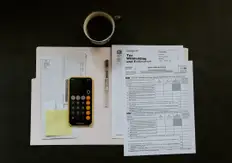Messaggia con Ava - Il tuo consulente aziendale con IA
Ciao sono Ava, la guida con IA che darà la carica alla tua attività!
Se hai già un'attività o sogni di avviarne una, sono qui per aiutarti a realizzare la tua idea con l'aiuto di freelance supportati dall'IA. Condividi i tuoi obiettivi aziendali e insieme creeremo un progetto su cui i nostri talentuosi freelance potranno fare delle offerte. Dai vita alla tua idea!
Ho un'attività
Voglio avviare un'attività
Non è stato possibile inviare la conversazione alla tua email. Riprova più tardi per piacere.
Puoi salvare la tua conversazione al massimo ogni ora. Riprova più tardi per piacere.
La tua conversazione è troppo breve. Continua a discutere con Ava per abilitare il salvataggio.
How to hire a freelance accountant for your business
Accounting services are vital to keep your business afloat, and to set you on a path towards growth. Find out what accountants do and who to hire
7 apr 2020 • Lettura di 9 minuti
Aggiornato il 14 ott 2022 da Kym D.

Passionate writer, journalist and editor
Impossibile copiare negli appunti. Riprova dopo aver modificato le tue autorizzazioni.
Copiato negli appunti.

A freelance accountant does much more than just balancing the books
Small business run on tight budgets so may not have the finances to hire a full-time accountant. Also, a small business may not need a permanent accountant.
Some small business owners try to keep up with their own accounting. Does this sound like you? Do you have the experience or time to keep up with the demands of daily paperwork? Taking on the role of accountant can cost your business opportunities and money if you get it wrong.
Your role is growing the business, not wrestling with financial paperwork or keeping up with government requirements. Unless you are an expert on tax department requirements, you can end up in hot water owing it thousands of dollars in fines. Not hiring an account can be an expensive mistake.
There is a simple solution. Hire a freelance accountant who understands the tax system in your country. It doesn't matter where they live. They can do the job from wherever they are and you only pay for the work they do. There is no obligation to keep them employed. No healthcare or superannuation requirements. No holiday or sick pay.
Also, do not make the mistake of hiring a bookkeeper to do the job of an accountant. They are two distinctly different jobs.
Difference between bookkeeping and accounting
Bookkeeping and accounting are both essential business functions. But there is an important difference between the two. A bookkeeper has the training to record financial transactions. An accountant has the qualifications to deal with the whole accounting process.
Role of an accountant
An accountant studies to qualify with at least a bachelor’s degree. And need a higher level of education to become a Certified Public Accountant.
Accountants analyze financial reports and transactions to interpret them to help business owners make sound decisions. An accountant can advise you when starting a business and help prepare business plans and budgets.
The tasks an accountant does includes:
Role of a bookkeeper
Bookkeepers do the groundwork for an accountant. They classify and record financial transactions usually at least on a weekly basis. In small organizations, bookkeepers use accounting software which allows them to produce reports that summarize data.
Benefits of an accountant
Working with an accountant has many business benefits. From preparing and filing tax paperwork to advising on business growth. These are just a few areas an accountant can be invaluable. The freelance accountant you hire should do more than just balance the books. You need to build a relationship so they become a trusted advisor.
Here is a rundown on the benefits of an accountant for your business.
When starting a business
When you start a business, an accountant can help determine the business structure. They will talk with you about the different structures and recommend which one will work best for you.
Whether you are self-employed, a sole trader, an LLC, or a C or S-Corp, your freelance accountant has the information you need. They will make sure the forms are filled in correctly and submit them. This is important as incorrect information on a form can delay tapping into the tax benefits.
Accountants can assist with a financial analysis of your business plan and give advice about the best financial software to use. They can also set up accounting procedures that comply with government regulations right from the start.
During normal business operation
Once your business is operating, your accountant deals with financial tasks to keep the money flowing and financial records up-to-date. Here are a few tasks an accountant deals with during normal business operations.
Dealing with taxes
Dealing with taxes is stressful. The help of an account throughout the year makes tax time easier.
Business taxes vary depending on your industry and where your business operates. The most common include:
Creating regular financial reports
You need regular financial reports to help make important business decisions. These include whether to hire staff, offer clients new services or buy expensive equipment. The most common reports include:
Compare your financials against industry standards
A freelance accountant will analyze your business financials and produce a report. They use this as a comparison against other businesses in your industry. Understanding your performance against industry standard key performance indicators (KPIs) gives you a basis for asking questions. Is your business meeting the standards? Is the business doing better or worse? What can you do better? Talk with your accountant about what you can do to boost your bottom line.
Assist in identifying key performance indicators
Your accountant can help set up KPIs. For example, you can base these on:
Talk with your freelance accountant about setting up KPIs. Track how they perform over a period of time and use them to make better business decisions.
When growing the business
It is important to have efficient business systems in place. These maximize your profit. Where you lack systems and operating procedures, a freelance accountant can help you put them in place.
Consult an accountant about good pricing strategies and ask for financial forecasts. This helps set you up to grow your business.
A senior freelance accountant with business growth experience can help by preparing a business plan and budget to support your goals. This assist you when making decisions to scale up production and resources, for example. It will also help you to pitch to investors and apply for business financing. A professional, realistic plan and budget increases the chance of receiving financing.
Your accountant can be a valuable resource that assists:
Tips for hiring a freelance accountant
Hiring a freelance accountant can be daunting. The process is easier if you know what you need and the hours of work weekly and monthly.
When you hire an accountant, it is not just about professional qualifications. Sure, you want them to handle everything from financial reports to filling out paperwork and paying tax requirements. But you may also want a proactive professional who gives sound financial advice to help the business grow.
While these are important you also want to consider the human factors: communication, integrity, honesty and work ethics.
Here are some tips to help you find the best freelance accountant to work with your business.
Write an effective brief
Write an effective brief to attract the type of freelance accountant that meets your expectations. It should include basic weekly requirements along with the precise services you need. The more details you include, the more likely you are to find the best person for the job.
Criteria your job brief should outline includes:
Develop a shortlist
Once you receive proposals, check out the background and experience of those who interest you. Then create a shortlist of candidates to interview. The following are some important points to consider when choosing candidates for a shortlist:
What a freelance accountant will cost
How much a freelance accountant costs depends on their expertise, training, the type and how much work they do for your business. It also depends on whether you are setting up a new business, planning growth, and if you want them to work on a regular or ad hoc basis.
Accountants working through freelancer can cost as little as $12 an hour. But beware. These may be accountants that live in other countries so they may not understand tax and government requirements for your country. Or, they may not have much experience or the right qualifications.
More experienced accountants charge upwards of $25 an hour. Senior business accounting consultants and those that specialize in an industry, such as law or healthcare, cost anything up to $100 an hour or more.
Remember. You get what you pay for. Thoroughly vet all candidates to make sure they can do the job and are not misrepresenting themselves. You need to know if you can trust them.
The following is a general cost guideline from successful freelance accountants with a good reputation:
Questions to ask candidates
Interview potential freelance accountants. Do this using the freelancer chat function. Do not be afraid to ask tough questions. It is no different than hiring a permanent employee to work in your business.
Talk to at least three candidates across a range of experience and hourly rates. This gives you a baseline to judge the candidates on.
Here is a sample of questions to ask potential freelance accountants:
After interviewing each one, you should have a good idea of who to hire. But if you still have reservations, ask more questions or look at other applicants. Even consider setting up trial projects to discover how they work in real-time.
Freelance accountants are integral to businesses
You are in business to make money so keeping up with the financial paperwork is an added burden. And, if you do not have accounting experience, it can cost you time and money when you do not get it right or you are late reporting to the government.
An accountant plays an integral role in your business. A freelance accountant relieves that burden so you can focus on what you do best: leading and growing your business. A freelance accountant is there when you need them. Hire a freelancer for hours weekly or monthly. Your call. Have them working when you need them. Freelance accountants are available, on call, to give advice to help you make good business decisions.
What are you waiting for? Start the hiring process now.
Dicci di cosa hai bisogno
Inserisci il nome del tuo progetto
Storie correlate
Parla con uno dei nostri assistenti tecnici che ti aiuterà con il tuo progetto
Articoli consigliati per te

Off-the-shelf CRM software might not be the best fit for your business. A custom solution can give you more control and cost you less
5 min read

Sales forecasting is a science. Here's how to hone your skills
3 min read

The global recession is predicted to hit us in 2020 but are we ready? Freelancing could be the solution that stabilizes the economy and saves us all.
5 min read

Is your business prepared to weather this profound period of change? Learn how to succeed while working from home.
12 min read
Grazie! Ti abbiamo inviato tramite email il link per richiedere il tuo bonus gratuito.
Non è stato possibile inviarti l'email. Riprova per piacere.
Caricamento anteprima
Autorizzazione per la geolocalizzazione concessa.
La tua sessione è scaduta ed è stato effettuato il log out. Accedi nuovamente per piacere.




